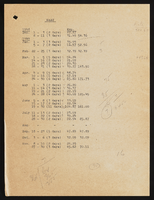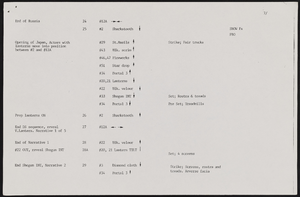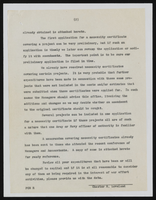Search the Special Collections and Archives Portal
Search Results
Audio recording clip of interview with T. D. Barnes by Julia Stetler, January 21, 2007
Date
2007-01-21
Archival Collection
Description
Narrator affiliation: Special Projects, Area 51; NERVA & NASA; Roadrunners Internationale
Sound
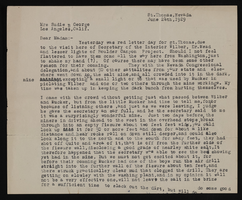
Correspondence, Levi Syphus to Sadie George
Date
1929-07-12
Archival Collection
Description
This folder is from the "Correspondence" file of the Sadie and Hampton George Papers (MS-00434)
Text

Transcript of interview with Rosemary (Conner) Cleman by Beatrice Owens (Gillard), March 8, 1981
Date
1981-03-08
Archival Collection
Description
On March 8, 1981, Beatrice Gillard interviewed Rosemary Cleman (AKA, Rosemary Conner, b. 1926 in New York, New York) about her experiences living in Southern Nevada and her background as a teacher and youth parole counselor. Conner begins by talking about how she ended up in Las Vegas to become a teacher for emotionally disturbed children and how she would eventually assist with the creation of the Nevada Girls Training Center, the first parole program for female juvenile offenders in Nevada. Conner also talks about the development of Las Vegas from when she arrived in 1952, and she discusses the segregation of the African American community in the city as well as her perspectives on the attitudes of the community as they related to it. Conner also mentions her coffee business, her personal interaction with Nevada Supreme Court justices, and her involvement in starting a grant-funded drug treatment program, known as Us, for juveniles. The interview concludes with Conner’s thoughts on the reemergence of mining communities in Nevada and her close interaction with Nevada governors during her roles in social service.
Text

Transcript of interview with Ron Donoho by Craig Brenner, February 28, 1978
Date
1978-02-28
Archival Collection
Description
On February 28, 1978, Craig Brenner interviewed Ron Donoho (b. 1929 in Amboy, IL) about some historical aspects on the history of Southern Nevada law enforcement. The first portion of the interview involves a discussion of the history of sheriffs in the Clark County Sheriff’s Office and eventually the Las Vegas Metropolitan Police Department. Donoho mentions various sheriffs, including Charles Corkhill, who was sheriff when Clark County formed in 1909, as well as Sam Gay, Joe Keate, Gene Ward, Glen Jones, “Butch” Leypoldt, and then-sheriff Ralph Lamb. Donoho spoke somewhat about the performance of some of these sheriffs as well as the political factors involved during their leadership. The latter part of the interview includes a list of fallen officers who were killed in the line of duty in Southern Nevada, dating back to Ernest May’s death in 1933. Donoho, who researched much of the material of the interview, also spoke several times about his personal familiarity and acquaintance with some of the law enforcement officials mentioned.
Text

Transcript of interview with Roger Bryan by Paul Murphy, February 27, 1979
Date
1979-02-27
Archival Collection
Description
Roger Bryan (born 1938 in Cedar City, Utah) is interviewed by Paul Murphy in his office about his experiences living in Las Vegas. Bryan, who was the principal of Harvey Dondero Elementary School at the time of the interview, mainly discusses his background in education and his experiences teaching at various schools around Southern Nevada. Bryan mentions several of the cities he lived in prior to coming to Las Vegas as well as the various parts of town he lived in after arriving. He also talks specifically about the schools he attended in Las Vegas, the superintendents in charge of the school district, the decisions he made while on the school board, some of his experiences in being a teacher and principal, the extent of vandalism in schools, and how the school district has changed over the years. Bryan additionally recalls the visits of political figures to Las Vegas, some of the developmental changes in Las Vegas over time, the role of the Mormon religion in his life, and the types of recreational activities he and his family took part in. Bryan finalizes the interview with a discussion of the most influential teachers he had when he was a student.
Text
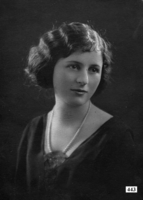
Photograph of Freda (Humphrey) Schuyler, Reno, Nevada, 1924
Date
1924
Archival Collection
Description
Freda (Humphrey) Schuyler in 1924, around 22 years old. Probably taken at time of her graduation from University of Nevada in Reno, earning her high school teaching certificate.
Image
Pagination
Refine my results
Content Type
Creator or Contributor
Subject
Archival Collection
Digital Project
Resource Type
Year
Material Type
Place
Language
Records Classification


